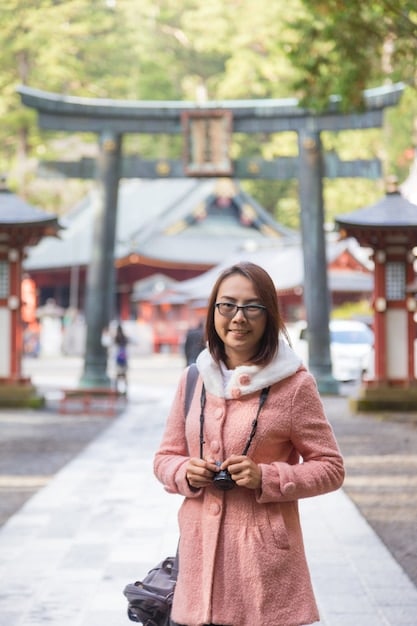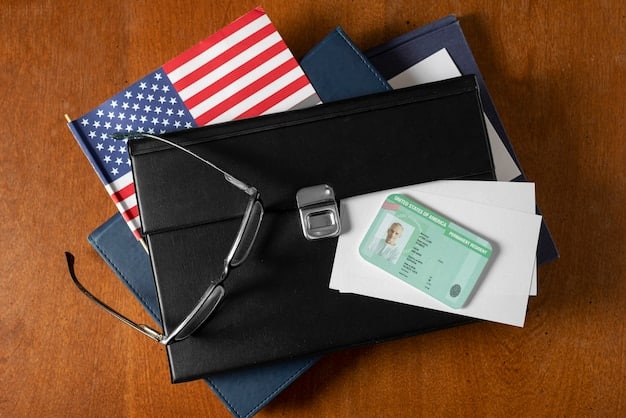Japan Visa 2025: US Citizens’ Step-by-Step Guide

Navigating Japan’s updated visa requirements for US citizens in 2025 involves understanding the types of visas available, preparing the necessary documentation, and following the application procedures carefully to ensure a smooth entry into Japan.
Planning a trip to Japan in 2025? Understanding the visa requirements is crucial for a smooth and stress-free journey. This guide provides a step-by-step overview of how to navigate Japan’s updated visa requirements for US citizens in 2025, ensuring you’re well-prepared for your adventure.
Understanding the Basics of Japanese Visas
Before diving into the specific steps, it’s important to understand the different types of visas available for US citizens visiting Japan. The appropriate visa depends on the purpose and duration of your stay.
Knowing the visa categories will help you determine which one suits your travel needs.
Types of Visas for US Citizens
Japan offers various visa categories, each designed for specific purposes. Here are some common types:
- Tourist Visa: For short-term tourism, sightseeing, and recreational activities.
- Business Visa: For attending conferences, business meetings, and other professional engagements.
- Student Visa: For individuals enrolled in academic institutions in Japan.
Visa Exemption for Short Stays
US citizens can enter Japan without a visa for tourism, business, or transit purposes for up to 90 days. However, this visa exemption does not permit you to engage in paid activities or employment.

Make sure to familiarize yourself with the permitted activities under the visa exemption program.
What Happens if I Overstay My Visa?
Overstaying your visa can lead to serious consequences, including deportation, detention, and a ban from re-entering Japan. Always adhere to the conditions and duration of your visa or visa exemption.
Understanding these basics ensures you start your journey on the right foot, with all the necessary information in hand.
Preparing Your Documents: A Comprehensive Checklist
Gathering the correct documents is essential for a successful visa application. This checklist will help you ensure you have everything required before you apply.
Having all your documents in order can significantly speed up the application process.
Essential Documents for All Applicants
Regardless of the visa type, some documents are required for all applicants. These typically include:
- Valid Passport: Your passport must be valid for the duration of your stay.
- Visa Application Form: Completed and signed visa application form.
- Photograph: A recent passport-sized photograph.
- Proof of Funds: Documentation showing you have sufficient funds to cover your expenses in Japan.
Additional Documents for Specific Visa Types
Depending on the visa type, you may need to provide additional documents. For example:
- Tourist Visa: Flight itinerary, hotel reservation, and a detailed travel plan.
- Business Visa: Letter of invitation from the Japanese company and a detailed itinerary.
- Student Visa: Acceptance letter from the Japanese academic institution and proof of enrollment.
Tips for Ensuring Document Accuracy
Ensure all documents are accurate and consistent. Any discrepancies or false information can lead to rejection of your visa application.

Double-check all details and seek professional advice if needed.
Proper document preparation can save you a lot of time and potential headaches during the visa application process.
Step-by-Step Guide to Applying for a Japanese Visa
Applying for a Japanese visa involves several steps, from filling out the application to submitting your documents. This guide breaks down the process to make it more manageable.
Following these steps carefully will increase your chances of a successful visa application.
Filling Out the Visa Application Form
The first step is to complete the visa application form. You can typically download this form from the website of the Japanese embassy or consulate in the US. Ensure you fill it out accurately and completely.
Provide all the necessary information and double-check for any errors.
Submitting Your Application
Once you have completed the application form and gathered all the required documents, you need to submit your application. This can usually be done in person at the Japanese embassy or consulate, or through an authorized visa application center.
Make sure to schedule an appointment if necessary and be prepared to pay the visa fee.
Paying the Visa Fee
There is usually a fee associated with applying for a Japanese visa. The fee amount varies depending on the visa type and your nationality. Check the website of the Japanese embassy or consulate for the current fee schedule.
- Payment Methods: Accepted payment methods usually include cash, credit card, or money order.
- Fee Schedule: Ensure you know the exact fee amount before submitting your application.
- Receipt: Keep a copy of the payment receipt for your records.
By following these steps, you can streamline the visa application process and avoid common pitfalls.
Understanding the Updated Visa Requirements for 2025
Visa requirements can change over time due to various factors. Staying up-to-date with the latest updates is crucial for a smooth travel experience.
Keeping informed about the updates ensures you meet all the necessary requirements.
Potential Changes in Visa Policies
Visa policies can be influenced by geopolitical events, bilateral agreements, and public health situations. It is advisable to check official sources for any recent announcements or changes to visa requirements.
Pay attention to any changes related to document requirements, processing times, and visa validity.
How to Stay Informed About Updates
To stay informed, regularly check the websites of the Japanese embassy or consulate in the US, as well as official government websites. Consider subscribing to travel advisories or following relevant social media channels.
Reliable sources will provide you with accurate and timely information.
Impact of Global Events on Visa Policies
Global events such as pandemics or diplomatic changes can significantly impact visa policies. Be prepared for potential changes and have contingency plans in place.
Staying proactive can help you adapt to any unexpected changes in visa requirements.
How COVID-19 Changed Visa Requirements
The pandemic significantly impacted international travel, and Japan was no exception. In response to COVID-19, Japan implemented strict border controls and modified visa procedures. These changes were aimed at preventing the spread of the virus and ensuring the safety of both visitors and residents.
Travelers should be aware of the requirements and restrictions currently in place. These often include proof of vaccination, pre-departure testing, and quarantine upon arrival. Be vigilant about these requirements.
Knowing the updated requirements will help you avoid any last-minute surprises and ensure a hassle-free trip to Japan.
Navigating Common Pitfalls and Challenges
Even with careful planning, some challenges may arise during the visa application process. Knowing how to navigate these pitfalls can save you time and stress.
Being prepared for potential challenges can prevent them from derailing your travel plans.
Common Reasons for Visa Rejection
Visa applications can be rejected for various reasons, including incomplete applications, insufficient documentation, or concerns about the applicant’s intentions. Make sure to address these potential issues proactively.
- Incomplete Application: Ensure all fields are filled out accurately.
- Insufficient Documentation: Provide all required documents as per the checklist.
- Doubts About Intentions: Clearly state your purpose of visit and provide supporting evidence.
How to Address Application Issues
If you encounter any issues during the application process, such as a request for additional information or a rejection, respond promptly and professionally. Seek clarification from the embassy or consulate if needed.
Addressing issues proactively can improve your chances of a positive outcome.
Seeking Assistance from Visa Experts
Consider seeking assistance from visa experts or travel agencies that specialize in Japanese visa applications. They can provide valuable guidance and support throughout the process.
Professional assistance can be particularly helpful if you have complex travel plans or a history of visa issues.
What you should do if your visa is denied
If your Japan visa is denied, don’t panic. The first step is to carefully review the denial letter, as it often provides the specific reasons your application was rejected. Addressing these issues is critical for a successful appeal.
- Seek expert advice: Consider consulting with an immigration lawyer or a visa specialist who is familiar with Japanese visa regulations. They can help you understand the denial and provide guidance on the best course of action.
- Reapply: After addressing the reasons for the initial denial, gather all your documents and submit a new application. Be sure to include a cover letter that explains how you’ve addressed the issues raised in the denial letter and why you believe you now meet the eligibility requirements.
By addressing these common pitfalls, you can navigate the visa application process more effectively and increase your chances of a successful outcome.
Maximizing Your Visit to Japan in 2025
Once you have your visa secured, it’s time to start planning your trip! This section provides tips and resources for making the most of your visit to Japan.
Careful planning can enhance your travel experience and create lasting memories.
Travel Tips
Japan offers a unique blend of traditional and modern culture. Here are some tips to enhance your travel experience:
- Transportation: Utilize Japan’s efficient public transportation system, including trains and buses.
- Accommodation: Consider staying in a traditional Ryokan for an authentic experience.
- Cuisine: Explore the diverse culinary scene, from sushi to ramen and everything in between.
Cultural Etiquette to Keep in Mind
In Japan, certain cultural behaviors are expected depending on who you spend time with.
- Bowing: Learn how to bow properly as a sign of respect.
- Shoes: Remove your shoes when entering homes or traditional establishments.
- Tipping: Tipping is not customary in Japan.
Learn some local phrases to get by
Learning a few basic Japanese phrases can go a long way in enhancing your travel experience and showing respect for the local culture.
- “Konnichiwa” (こんにちは): This greeting is appropriate to use during midday and until the evening.
- “Arigato” (ありがとう): “Thank you.” You can use this to express gratitude for services or gifts.
- “Sumimasen” (すみません): Means “Excuse me” or “Sorry.” It is used to apologize for minor inconveniences or to request attention.
By embracing the local culture and traditions, you can create a more meaningful and enriching travel experience in Japan.
| Key Point | Brief Description |
|---|---|
| 🛂 Visa Types | Tourist, Business, Student – choose based on your purpose. |
| 📝 Required Docs | Passport, application form, photo, proof of funds, itinerary. |
| 📅 Stay Updated | Check official embassy websites for the latest changes. |
| ✅ Common Pitfalls | Incomplete applications, insufficient funds, doubts about intentions. |
Frequently Asked Questions
▼
No, if you enter Japan visa-free as a US citizen for a short-term stay (up to 90 days), you generally cannot extend your stay or change your visa status while in Japan. If you wish to stay longer or engage in activities not permitted under the visa waiver program, you must apply for the appropriate visa before traveling to Japan.
▼
Your passport should be valid for the duration of your stay in Japan. It’s generally recommended to have at least six months of validity remaining on your passport beyond your intended stay. If your passport is set to expire soon, renew it before applying for a visa or traveling to Japan.
▼
Yes, all individuals, including children, need a visa or must meet the visa waiver requirements to enter Japan. Children are not exempt from visa requirements. If your child is a US citizen, they can enter Japan visa-free for tourism or business purposes for up to 90 days.
▼
The processing time for a Japan visa can vary depending on the embassy or consulate, the type of visa, and individual circumstances. It typically takes around 5 to 10 business days. You should apply well in advance of your intended travel date to allow for processing time.
▼
Engaging in paid work or employment is generally not permitted on a tourist visa or under the visa waiver program. It is essential to comply with the conditions of your visa or visa waiver. If you plan to work remotely in Japan, you should consider applying for a work visa.
Conclusion
Navigating Japan’s visa requirements for US citizens in 2025 may seem daunting, but with careful planning and preparation, you can ensure a smooth and enjoyable travel experience. Stay informed about the latest updates, gather all the necessary documents, and follow the application procedures diligently. By doing so, you’ll be well on your way to exploring the wonders of Japan.





